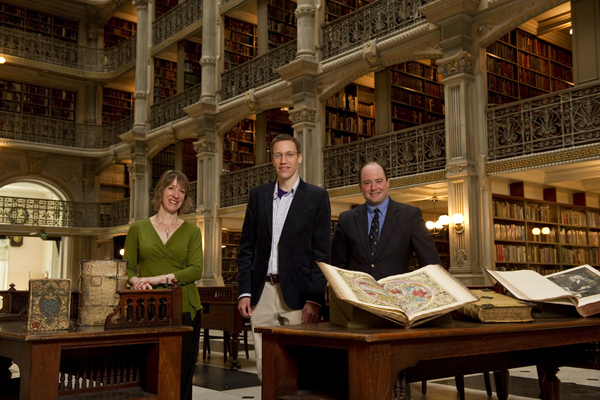April 12, 2010
Museums and Society Program hosts community symposium
Baltimore-based group of curators, artists and collectors will engage local audiences

Elizabeth Rodini, Nick Spicher and Earle Havens in Johns Hopkins’ George Peabody Library, where ‘Collections and Communities: Baltimore Today’ will be held. Photo: Will Kirk/Homewoodphoto.jhu.edu
Befitting its name, the Program in Museums and Society in the Krieger School of Arts and Sciences is hosting a community symposium this week with a group of Baltimore-based curators, artists and collectors to discuss the challenges and opportunities museums face in making their collections more accessible, engaging and relevant to local audiences.
“Collections and Communities: Baltimore Today” will be held at the George Peabody Library, part of the university’s Sheridan Libraries Special Collections, from 2:30 to 5:30 p.m. on Friday, April 16.
The hope is that the symposium will facilitate conversations on a range of important professional issues while fostering future collaborations between local museums and Johns Hopkins students. The event was organized by Elizabeth Rodini, associate director of the Program in Museums and Society, and Nick Spicher, a doctoral student in the Department of History of Science and Technology and an assistant with Museums and Society. Rodini says she anticipates the creation of similar events, such as a student-organized symposium on the business of culture that is envisioned for next year.
“We believe this is very much in keeping with President [Ronald J.] Daniels’ interests in reaching out and engaging more fully with Baltimore,” Rodini said. “Students get a certain academic perspective in their courses, and some are working behind the scenes, but this symposium will introduce them to people in the local museum community who are grappling with day-to-day issues. We’ll be talking about outreach and how museums can make the work they do more relevant and engaging for the public.”
The symposium is geared toward local museum professionals as well as any interested faculty, staff and students. The panel will include Aaron Bryant, curator of the James E. Lewis Museum of Art at Morgan State University; Peter Bruun, artist and founding director of Art on Purpose; George Ciscle, a collector who is curator in residence and coordinator of the curatorial studies concentration at the Maryland Institute College of Art; Lori Finkelstein, director of education and interpretation at the Baltimore Museum of Industry; Anita Kassof, associate director of the Jewish Museum of Maryland; and Sam Rogers, executive vice president of Visit Baltimore.
The event will begin with a short presentation by Earle Havens, curator of rare books at the Sheridan Libraries, who will speak about the Peabody Library’s historical roots as a public research library serving the Baltimore community and the public debate that went on about the proper nature of building the collection to serve the intended audience. “My hope is that it will offer a starting-off point for thinking about collections in the context of their relationship to institutional histories and to changing social contexts more generally,” he said. Begun in 1860, the library collection contains more than 300,000 volumes, largely from the 18th and 19th centuries.
The core of the event will be the panel discussion, lasting approximately 45 minutes and moderated by Rodini. While she doesn’t know exactly where the conversation will go, Rodini says she thinks that the group is likely to touch upon such concerns as how to build collections that meet the needs of a museum and the expectations of its visitors, how to make historical collections relevant to today’s audiences, and the virtues and liabilities of technology in a museum setting. Following the panel, there will be a question-and-answer session, as well as time for casual conversation and networking.
“There will be time for informal conversations that will hopefully plant the seeds for future collaborations and allow some people who might not have a chance to get together to get together,” Rodini said. “We’ve invited an audience that is deliberately cross-disciplinary and from museums of all sizes and scopes.”
The event is free, though reservations are requested; for an online form, go to http://krieger.jhu.edu/museums/rsvp.

